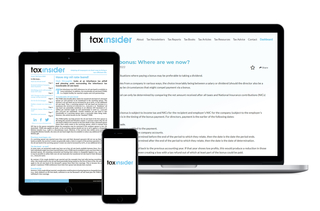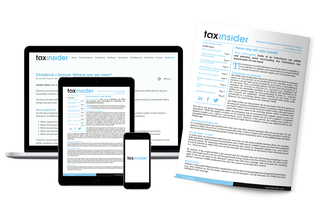New articles published
in August 2024
-
Loans to shareholders rules: An unexpected twist?
HMRC does not like private companies lending money to their owner-managers, and there is a raft of provisions aimed at discouraging such debts – from benefits-in-kind rules to the ‘quasi-distribution’ provisions in CTA 2010, Pt 10, Ch 3, which kicks off with the notorious section 455.
Ken Moody explores the scope of a sometimes overlooked provision in the private company loans to shareholders rules, which could give rise to an unexpected ‘loan’ to the Treasury.
-
When are director's remuneration and dividends deemed to be paid?
For directors, remuneration is typically assessed on an annual earnings period basis; all earnings for the tax year are considered, rather than looking at each pay period individually. This approach recognises that directors often have irregular payment patterns and bonuses rather than a set amount per month.
Jennifer Adams looks at timing and tax implications of common methods of payment of directors.
-
Holding property on behalf of another family member - tax implications
The distinction between legal and beneficial ownership of land and property (in English law) is important. When a dwelling is (say) transferred from one individual to another, the names shown on the conveyance will be the legal owners.
Mark McLaughlin looks at beneficial ownership when property is bought by a family member and held on behalf of another family member.
-
Some employment issues for your radar!
Whilst we now have a new UK government, employers, payroll and employment law professionals should not forget the last parliamentary session as we wait for developments later this year, all affecting employers, and most impacting payroll.
Ian Holloway looks at employment law and payroll developments affecting employers.
-
Trusts: IHT issues and benefits
Trusts can be a very useful planning tool for inheritance tax (IHT) purposes, as well as family and business succession planning.
Chris Thorpe looks at how trusts and inheritance tax interact and how useful they can potentially be.
-
How many miles?
Substantial increases in tax charges over the years have removed much of the attraction of company cars; employees will often, instead, use their own car for employment purposes.
Richard Curtis outlines HMRC’s approved mileage allowance regime.
-
Buying a business and retaining the VAT number
When someone buys the trade and assets of a business, they have the option of retaining the VAT number. How is this done, and what are the ‘pros’ and ‘cons’ of doing so?
Andrew Needham looks at some consequences of retaining the VAT number when someone buys a business.
-
Q&As with Arthur Weller
Some of our most popular articles
-
Tax implications of awarding shares to family members
The employment-related securities legislation deals with arrangements involving shares and securities provided by reason of employment where the full value of the employment reward provided to the employee is not included in the salary package and is charged to tax.
Jennifer Adams considers the tax implications of shares in a family company being awarded or gifted to family members of employees.
-
Decisions, decisions! Partnership or limited company?
A sole trader looking to expand their business might be weighing up the ‘pros’ and ‘cons’ of a partnership or a limited company. They are very different, with not only very different tax consequences, but functions as well.
Chris Thorpe looks at partnerships and companies and considers which business model might be best.
-
Don’t write off your chances of tax relief!
Under the loan relationships rules for companies, debits on loan arrangements are not deductible for corporation tax purposes in some circumstances.
Kevin Read highlights a recent case concerning the loan relationship rules for companies.
-
Who has tipped HMRC off?
When HM Revenue and Customs (HMRC) opens a tax return enquiry, the natural reaction of most taxpayers is to speculate about the reason why their tax return has been selected. In fact, HMRC does not need an excuse to open a tax return enquiry; a small proportion of tax returns are simply selected at random. .
Mark McLaughlin looks at whether a taxpayer can find out if an HMRC enquiry has been opened as the result of an accusation made by a third party.
-
Remuneration in 2024/25 - Important Considerations
When considering the tricky matter of remuneration planning, there are two things to consider; the amount of remuneration, and what form it takes.
Chris Thorpe looks at what to watch out for with regard to paying employees and directors.
-
Alternative ways of paying staff tax-efficiently
Despite the reduction in National Insurance contributions (NICs) in Spring Budget 2024, more employees are paying tax at higher rates on their earnings due to the freezing of tax thresholds. Some may find that any pay rise or bonus attracts additional tax and NICs such that the net pay increase is minimal.
Jennifer Adams looks at some alternatives to rewarding an employee with a pay rise or a bonus.
-
A popular ‘exit’ strategy when a shareholder is retiring
Mark McLaughlin looks at company purchases of own shares and warns not to become too focused on the more difficult rules for capital treatment.
A company purchase of its own shares from a shareholder is a popular ‘exit’ strategy when an individual shareholder is retiring, or a dissenting shareholder is departing.
-
Q&As with Arthur Weller
Subscription Benefits
We asked our subscribers what they love about Tax Insider.
These are the top 7 reasons that they gave us:
Monthly Newsletter
Tax Insider…





